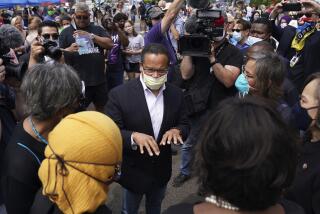Study Identifies Race’s Pervasive Importance
- Share via
BOSTON — Race continues to play a powerful role in the chances for success in America, from job opportunities to education to housing, according to a sweeping five-year study of Boston, Atlanta, Detroit and Los Angeles.
The Multi-City Study of Urban Inequality, released Friday, found that racial stereotypes and attitudes heavily influence the labor market, with blacks landing at the very bottom.
The mammoth seven-volume survey was sponsored by the Russell Sage Foundation, a private center that researches social policy, and the Harvard University Multidisciplinary Program in Inequality and Social Policy. It looked at 9,000 households and 3,500 employers in the four cities.
The 50 researchers found that race is deeply entrenched in the country’s cultural landscape--perhaps even more than many Americans realize or are willing to admit.
“I think this study tells you not only that some of these perceptions are true, but it tells us in more detail where inequality is being generated,” said Alice O’Connor, a historian at the University of California who wrote the introduction to the report.
Initiated in the early 1990s, the project attempted to understand the patterns of racial inequality in modern metropolitan areas and how race has been affected by economic changes.
According to the study, race has a pervasive influence at many levels, manifesting itself in everything from highly segregated housing to labor markets that prefer hiring some racial groups over others. Stereotyping is often at play, particularly when it comes to where people want to live and whom they will hire, O’Connor said.
Blacks “continually end up at the bottom in terms of preferences for neighbors as well as when employers talk about hiring preferences,” she said.
Although the study found that minorities are doing better in the strong economy of the 1990s, it found that they are making less money and working fewer hours than their white counterparts. It also found that they had a significantly harder time landing a job.
In Detroit, for example, it took unskilled, unemployed whites an average of 91 hours to generate a job offer. It took blacks 167 hours.
“Clearly there is a heavy burden that minorities face in the job market,” said Katherine Newman, an urban studies professor at Harvard’s Kennedy School of Government. “Minorities are working, but they’re diverging in their good fortune from whites.”
Both the household surveys, conducted by telephone between 1992 and 1994, and the employer interviews identified pervasive stereotypes, particularly regarding blacks.
Blacks, many of those surveyed said, are more likely to be on welfare, more likely to commit crimes and harder to get along with than other groups.
In the work force, where native-born blacks are losing jobs to recent immigrants, employers indicated that blacks rank low on their hiring preference charts.
Employers also were fearful of relocating to areas that were perceived as heavily minority.
More to Read
Sign up for Essential California
The most important California stories and recommendations in your inbox every morning.
You may occasionally receive promotional content from the Los Angeles Times.













